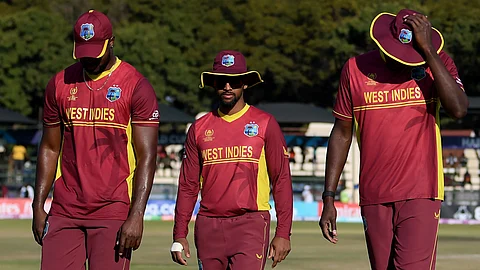

VK Sanju
No matter where you search on the world map, you will not come across a country called the West Indies as it exists merely in the realm of cricket. Be it the anthem 'Jana gana mana' that sees pride in the Indian stars or 'God Save the King' where English team members hold their hands close to their hearts, there is no such paean for the West Indies team. Windies stars tap to the beat on hearing 'Rally Round the West Indies', a mere calypso song. The West Indies is a group of 13 independent nations – united only for playing cricket. They have no shared anthem or flag and even the famous logo of a palm tree and a set of cricket stumps is the exclusive of the West Indies Cricket Board and is no national symbol.
What can be characterised as Caribbean nationalism is only during times of cricket matches. It symbolises the struggle between whites and blacks, and is also a figurative protest against the tradition of slavery. The tradition can be traced back, though to the very least, to that moment when Brian Lara after his century against South Africa declared that he did not want to lose to white Africans, a sentiment that existed till then!
The stage was set in the World Cup without the mighty West Indies for the first time in history when they failed to chase the target of 269 runs set by Zimbabwe, lost in the super over even after posting a massive target of 375 before the minnows Netherlands and were finally bowled out for just 181 runs and Scotland managed to reach 185 losing just three wickets. This decline of West Indies cricket did not begin here, but was just a culmination.
The upcoming ODI World Cup becomes all the more notable with the absence of the winners in 1975 and 1979, the Champions Trophy winners in 2004 and the champions of the Twenty20 World Cup in 2012 and 2016. The team of the past led by Clive Lloyd was a cohesive one, though the present one led by Shai Hope relied heavily on individual performances. The names of Gordon Greenidge and Desmond Haynes are mentioned in tandem, just like the pace battery of Joel Garner, Michael Holding, Andy Roberts and Malcolm Marshall. Perhaps, only Vivian Richards stood out, maintaining a stunning strike rate of 90 in his ODI career. He was also the great Sachin Tendulkar's idol.
After the Courtney Walsh-Curtley Ambrose era, there seemed to grow in the West Indies a shift towards individual performances where Brian Lara, Carl Hooper, Shivnarain Chanderpaul and Dinesh Ramdin showcased exceptional talent but could not transform the team into a formidable one. Chris Gayle, renowned as the only universal boss in Twenty20 cricket, earned that title primarily through franchise cricket and not while donning the West Indies jersey.
The selectors had no hesitation in keeping Sunil Narine, Andre Russell or Dwayne Bravo out of the West Indies squad when they were at their prime and were the much sought-after by Twenty20 franchise worldwide. Perhaps they believed that it was more advantageous for these stars to retain their status in franchise cricket rather than being part of a team of multiple nations.
It is not just that West Indies did not qualify for the World Cup; but a greater matter of concern is that they had to undergo the drill of playing in the qualifiers despite having players like Nicolas Pooran, Shimron Hetmyer and Jason Holder who are at the peak of their careers.
When the bribery scandal rocked Indian cricket during its peak time, BCCI took a significant decision to see every cricketer would have a guaranteed income surpassing what even a bookie could offer. This not only benefited players in the national team but also those outside, placing them among the highest earning sports persons globally. In stark contrast, West Indies cricketers had to face numerous challenges, forcing them to resort to strikes and boycotts demanding better wages. They were put in a piquant position, unsure about who they had to address their concerns about inadequate training facilities or infrastructure – the board or their respective governments on scattered islands.
While some like Jofra Archer venture for opportunities outside as expatriates, those like in the cricketing world, Narine and Russell have explored condensed versions like T20 and T10 leagues. On the other hand, cricketers like Shai Hope and Craig Brathwaite, with little scope for developing their skills, have limited themselves to playing qualifiers as there are no franchises in Tests and ODIs. Fans admiring the one-time greats like Clive Lloyd and King Viv, who never had a country to call their own, are eagerly awaiting the emergence of their successors.
